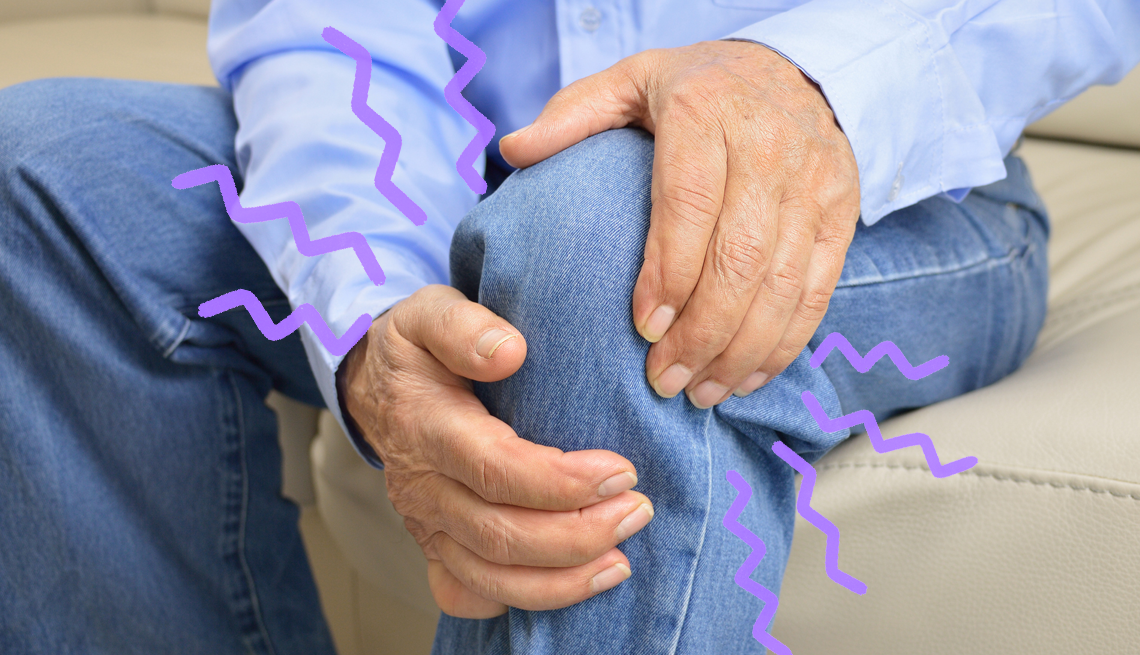Injections for Knee Pain Are Common — But Do They Work?
Injections for Knee Pain Are Common — But Do They Work?"
- Select a language for the TTS:
- UK English Female
- UK English Male
- US English Female
- US English Male
- Australian Female
- Australian Male
- Language selected: (auto detect) - EN
Play all audios:
Photo Collage: AARP (Source: Getty Images) Facebook Twitter LinkedIn
When Carole Porter’s* knees gave way to osteoarthritis in her late 50s, she started getting injections of hyaluronic acid (HA) gel every six months. For the next 10 years, Porter says, her
knees were fine — until one day the injections stopped working. “I couldn’t walk 100 feet without terrible pain,” says the New York business executive, now 76. Permanent relief ultimately
came by way of knee replacements.
Los Angeles architect Steven Ehrlich, 77, finds that every year or so, an injection of platelet-rich plasma (PRP) into his arthritic left knee provides some relief, enough for him to pursue
an active lifestyle of golf, paddle tennis and heli-skiing. Although Ehrlich’s osteoarthritis is moderate, he’s relatively pain-free.
Kathy Cope had a very different experience. After suffering with osteoarthritis in her knees for 20 years, she tried HA injections in 2022. Taken over two months, the injections had no
effect at all. Cope, 76, a retiree who splits her time between New York and Florida, soon went the knee-replacement route.
About 1 in 7 people diagnosed with knee osteoarthritis will receive some sort of injection to treat the painful, sometimes debilitating, symptoms of the disease. Yet studies in recent years
have found that most of these injections actually do very little to improve osteoarthritis in the knees and are only slightly more effective than a placebo.
“They are safe, with minimal downsides; they may be helpful, and we don’t have many other great options,” says Scott Rodeo, M.D., codirector of the Orthopedic Soft Tissue Research Program
at Weill Medical College of Cornell University in New York. But medical organizations have pulled back on their endorsements of knee injections.
In its 2021 guidelines, the American Association of Orthopaedic Surgeons (AAOS) “conditionally recommended” the use of one type of injection — corticosteroids — and advised against HA
injections. Two other types — PRP and stem cell injections — are not fully approved by the Food and Drug Administration and are regarded as experimental by insurance companies.
Shutterstock
To help you wade (knee-deep) through the confusing world of injections, here’s a rundown of the most common kinds of shots and what the experts say about them.
CorticosteroidsWhat are they? After weight loss, exercise and anti-inflammatories, corticosteroids are usually the next option for treating knee pain. Corticosteroid shots are a combination of the steroid
cortisone and a numbing agent that is injected into the knee for fast, temporary relief during a flare-up.
Do they work? Yes. They’re regarded as the fire extinguisher of knee injections — they usually start working within 48 hours to reduce pain and inflammation around the knee joint. Studies
show corticosteroids can effectively provide short-term relief, though some people report success over a longer period.
“I’ve had patients who received injections in their knees every three months for several years,” says Cara Cipriano, M.D., an associate professor of adult reconstruction at the Perelman
School of Medicine at the University of Pennsylvania. “Others feel that over time, the effects fade. In these situations, we move on to other treatments.”
What to know: Corticosteroids are typically administered up to four times a year. Although they’re relatively safe and effective, overuse may contribute to further deterioration of knee
cartilage. People with diabetes or other metabolic conditions should be aware that they may increase blood sugar levels. Corticosteroid injections are covered by Medicare Part B and other
insurance plans.
Trending News
Job-Hunting Tips for Adults With DisabilitiesPhysical and cognitive disabilities shouldn’t stop you from a successful job search. Getty Images Facebook Twitter Linke...
Worst mistake to never do during hot weather that will lead to death of plantsGardening can be a little tricky when hot weather emerges and temperatures soar past 30 degrees as it leaves room for a ...
High blood pressure: the green drink that lowers hypertensionAs the NHS points out, salt raises your blood pressure. "The more salt you eat, the higher your blood pressure. Aim...
Under the gun - Los Angeles TimesOrange County supervisors were looking for someone to transform the sheriff’s office when they hired an outsider last ye...
The joy of heels: Kristen Stewart ditched her heels...but nothing beats being well shod | Express.co.ukKRISTEN STEWART DITCHES HER HEELS ON CANNES RED CARPET As she removed her stilettos – with their signature lipstick-red ...
Latests News
Injections for Knee Pain Are Common — But Do They Work?Photo Collage: AARP (Source: Getty Images) Facebook Twitter LinkedIn When Carole Porter’s* knees gave way to osteoarthri...
'i let my dog sleep in bed – but i'm having second thoughts after bathing her'Dogs are super loyal, and sometimes, means they end up following you up to the bedroom when they’re a tiny pup, then a l...
Women passengers in Chennai allowed to use suburban trains from Nov 23SubscribeSUBSCRIBER ONLYPODCASTPODCASTSouth CentralWhats Your Ism?VIDEOVIDEOLet me explainYen Endra KelviLONG FORMFLIXSU...
Laissez-faire republican is battling the comcast-nbc dealThat labor unions such as the Communications Workers of America, advocacy groups including the National Coalition of Afr...
“Promise to Address Comprehensive Toxics (PACT) Act” EventThe location is in the Conference Center Main Entrance, located south of the Hotel Main Entrance, in the Black River Roo...
